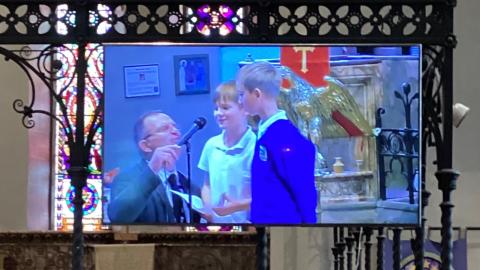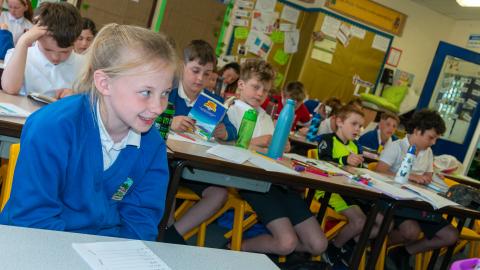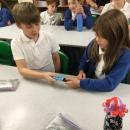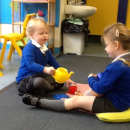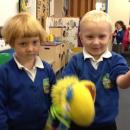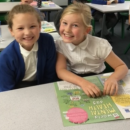RE at Settle CE VC Primary School
Curriculum Intent and Aim
At Settle CE VC Primary School our subject leader is Mrs Lait, who is also our Nursery teacher.
As a Church of England School; our vision and values are at the heart of everything we do. In line with our overall curriculum intent:
“Growing and learning Together”
“Settle Church of England Primary School is a place where all children are Loved, Valued and Flourish to achieve their potential”
At Settle Primary School we value RE, and understand that it can aid pupil’s own personal development, supporting an understanding of the spiritual, moral, social and cultural questions that surface again and again in their lives.
RE tackles difficult questions and provides pupils with an insight that can work to challenge stereotypes, promote cohesion, and tackle extremism, preparing pupils for their lives in a diverse society.
‘In religious education (RE), pupils enter into a rich discourse about the religious and non-religious traditions that have shaped Great Britain and the world. RE in primary and secondary schools enables pupils to take their place within a diverse multi-religious and multi-secular society. At its best, it is intellectually challenging and personally enriching. It affords pupils both the opportunity to see the religion and non-religion in the world, and the opportunity to make sense of their own place in that world.’
Ofsted’s Research Review: Religious Education May 2021
We aim to engage our pupils in systematic enquiry into the ‘Big Questions’ (Enquiry Questions) which religions and worldviews address. We want our pupils to develop the understanding and skills needed to consider, appreciate, and critique the responses of others to the ‘Big Questions’.
We intend to provide opportunities for our pupils to reflect on their own responses in light of their new knowledge, and to consider if their position remains the same, or has changed.
We want our pupils to understand the role of foundational texts, beliefs, rituals, and practices and how they help form identity in a range of religions and worldviews. They will explore how these may change in different times, places and cultures. RE in Settle Primary School will go beyond a sociological study of religious phenomena and will introduce pupils to a range of relevant disciplines including theology, philosophy and the human and social sciences.
Learning activities will provide fully for the needs of all pupils. Our pupils will have opportunities to develop a wide range of skills including enquiry, analysis, interpretation, evaluation and reflection.
In light of the Church of England’s ‘Religious Education in Church of England School’s RE Statement of Entitlement ‘, our pupils will have access to an
‘RE curriculum that enables pupils to acquire a rich, deep knowledge and understanding of Christian belief and practice, this should include the ways in which it is unique and diverse.’
At least 50% of the RE curriculum at Settle CE VC Primary School will be based on Christianity.
Curriculum Implementation
The concepts of Believing, Expressing and Living are the foundation and structure of our curriculum implementation.
The North Yorkshire Agreed Syllabus for Religious Education 2019 – 2024 is used as the basis for planning a systematic RE curriculum at Settle Primary School. In addition to this, ‘Understanding Christianity’ units are used when the content of the unit is focused on Christianity. The Long-Term Plan for RE shows how the two are interwoven to ensure that there is a minimum of at least 50% Christianity. The units from the North Yorkshire Agreed Syllabus have been organised and ordered in mind with the pupils in our school. There is a balance of units focussing on Believing, Expressing and Living. Learning is aligned across and within year groups.
As we are a church school, RE is a core subject, as such the minimum allocation for curriculum time is 5% which equates to approximately 50 minutes a week or some short sessions implemented through continuous provision for our Reception pupils, and 1 hour per week for our KS1 and KS2 pupils. RE days or RE weeks may also be used to deliver the RE curriculum from time to time.
Staff will plan all units of learning based on the learning outcomes from the North Yorkshire Agreed Syllabus. The learning outcomes have been used to create end points for each unit of work. Staff will use engaging stimuli and develop active learning opportunities and investigations to ensure pupils achieve the outcomes and have high levels of engagement. At Settle Primary School our RE curriculum is inclusive for all learners, and staff work hard to ensure children are supported, challenged, and stretched at a level that will ensure progress in RE for all children.
In Early Years, RE is taught through play-based activities and also in discrete lessons. Additional opportunities are provided in PSHCE based activities and in other areas of the Early Years Statutory Framework 2021.
To ensure automaticity of recall knowledge in all units of work throughout the year, teachers in Y1-6 use:
- Knowledge organisers are accessed by pupils within lessons to support their current, past and future learning. Key vocabulary is accessible here at all times for pupils to check their understanding.
Quick quizzes - these questions at the start of the unit will assess what the children remember from previous lessons.
EYFS and KS1 pupils RE work is recorded in a class ‘Floor Book’. In KS2 RE is recorded in a class ‘Floor Book’ and in individual pupil books.
In addition to the weekly RE lesson, activities are complimented by a variety of visits to places of worship and visitors. The children are also given opportunity to explore their own spirituality through daily worship.
Impact
Pupils are assessed throughout lessons and at the end of units. This allows planning to be adapted in order to meet the needs of pupils, and give targeted support where it is required.
Knowledge organisers are increasingly used to support learning and aid recall of RE learning.
An increased variety of teaching strategies and activities in RE lessons have been used which have increased pupil engagement and further developed RE skills.
The impact of our RE curriculum is monitored through lesson observations, book looks, pupil interviews and discussions with staff.
Pupils are positive about RE and during a pupil voice exercise, pupils could explain how RE might be useful for them outside the school environment.
‘I sleep better because God is always near me.’
‘It helps me to understand if I meet someone with a different belief. I would know how to act around them.’
‘It’s nice to think and know about what other people believe. It does make me think a lot and question.’
‘You can share ideas with other people, see what they think, and it can bring you closer.’
‘If I met other people who are e.g. Christian, I would know how to react and connect.’
Floor books are now used in each class to evidence learning in RE. Pupils are involved in creating the books and they can be used as a reference to prior learning. Floor books and RE learning wall provide increased evidence of pupil’s responses to the ‘Enquiry Questions’.
Lesson observations show that pupils were engaged and motivated in RE lessons. Pupils were keen to share their extensive subject knowledge. Mispronunciations or misconceptions were picked up and corrected by the teacher.

